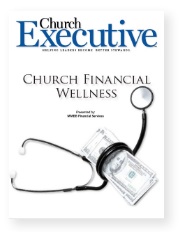
![]() By Rev. Dr. Patricia L. Hunter, CFP®
By Rev. Dr. Patricia L. Hunter, CFP®
Everyone is familiar with the advice that most financial planners share about saving for retirement — the best time to start planning and saving for retirement is in your 20s.
For any number of reasons, far too many people do not get started that early.

Retirement can seem so far in the future that people are not motivated to begin saving. After all, at 25, you can tell yourself that you have plenty of time.
Many pastoral leaders understand that choosing to serve God often means accepting lower compensation than other professions with comparable training and education. Even managing day-to-day expenses can be a challenge, and saving for retirement is viewed as another expense that squeezes the budget.
Even for those who do get an early start, their savings might have been interrupted (or spent) because of unforeseen life circumstances.
Whatever the reason, if you find yourself in the position of having to play catch-up in your 40s and 50s — even though you most likely cannot make up for the years you’ve lost — there are steps you can take to put yourself in a better position for your retirement.
Start saving now
This is the most important step you can take — and save as much as you can. Every day that goes by without you saving only escalates the problem, and you can’t afford to wait another year or three years and look back with regret yet again.
Don’t spend time beating yourself up for not getting started. Take action now, and recognize that you will need to cut unnecessary expenses and do some sacrificial saving.
Maximize your contributions to your employer-based 403(b) retirement plans. If your church or faith-based organization offers a matching plan, make a commitment to contribute that amount or percentage so you can take advantage of the employer’s matching contribution. Arrange to have the money automatically deducted from your paycheck. For 2020, you can contribute up to $19,500 to an employer 403(b) plan, and if you are 50 or older, you can make an additional $6,500 catch-up contribution.
Be sure to save any salary increases or honoraria from guest preaching, workshops or other additional income.
Pay off as much debt as you can

If you are carrying a significant amount of seminary or consumer debt, that cuts into how much you can save. You might have to work on reducing debt while saving a small amount initially. As your debt load decreases, you can increase the amount you contribute to your retirement account.
Don’t try to figure this out on your own, and don’t be embarrassed to admit what you don’t know about money. A CERTIFIED FINANCIAL PLANNER™ professional can work with you to design a plan to reduce your debt.
Whatever you do, don’t take on any additional debt. Ideally, you want to be able to move into your retirement with as little debt as possible, so your cash flow can be directed toward living expenses.
Consider delaying Social Security
This will allow you to maximize the amount you receive. If you can wait until age 70 to claim your Social Security benefits, you will receive a 7% to 8% benefit increase for every year past full retirement age (FRA) that you delay. FRA is calculated according to your birth year. Visit the Social Security benefits planner to determine your FRA.
Not everyone is able to postpose Social Security benefits, but there are solid financial reasons to claim your benefit later if you can. Keep in mind that once you claim your Social Security benefits, you are locked into that benefit amount and the cost-of-living adjustments (COLA) associated with that amount. Not only will you end up with a larger benefit amount if you wait, but the COLA will be applied to that larger amount, as well.
Remember that clergy persons are considered to be independent contractors for Social Security and are responsible for making quarterly payments to the IRS. Be sure to work with a tax professional who understands clergy taxes, and make sure that Social Security is paid on your current salary because your payout is based on the highest 35 quarters of earnings during your working years.
Stay on the job longer, or consider working part-time in retirement
One way to boost your standard of living in retirement is by remaining in the workforce a little longer. You will have more years to contribute to your retirement account, and any additional years you work means you do not have to begin drawing on your retirement savings.
Begin thinking now about ways you can generate additional income in retirement. For clergy persons, that might mean teaching or consulting, working as an interim pastor, or providing seminars you design in an area of expertise. It might also mean pursuing work in other interests and using other skills. Easing into work that generates part-time income before you retire will allow for an easier transition and give you a sense of how much additional income you can count on.
Remember, now is the time to take steps to funnel as much cash as possible toward your retirement savings account(s). Working with a CERTIFIED FINANCIAL PLANNER™ professional will help you set a realistic retirement goal and map out the steps that will help you reach it. To find a CERTIFIED FINANCIAL PLANNER™ professional near you, visit the Certified Financial Planner Board of Standards, Inc. website.
With focus, discipline and determination you can work to provide more income for your retirement.
Rev. Dr. Patricia L Hunter, CFP® brings 30 years of experience to her ministry as Director of Financial Wellness Programs. Before joining MMBB in 1987, she served as assistant pastor of the Mount Zion Baptist Church in Seattle. Rev. Dr. Hunter also has a master of divinity degree from Colgate Rochester Crozer Divinity School and a doctor of ministry degree from the Saint Paul School of Theology in Kansas City, Missouri.


